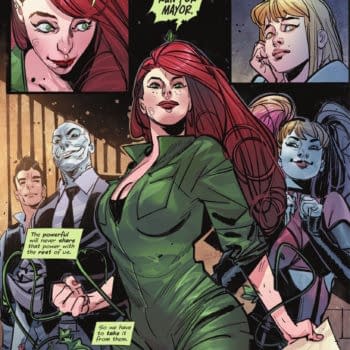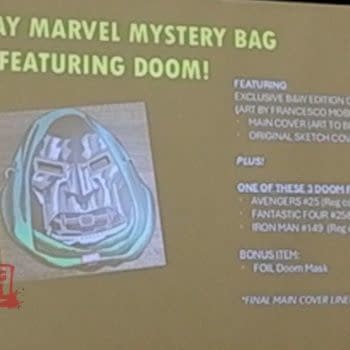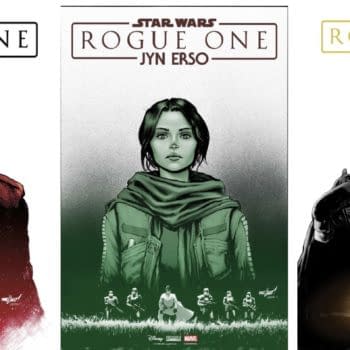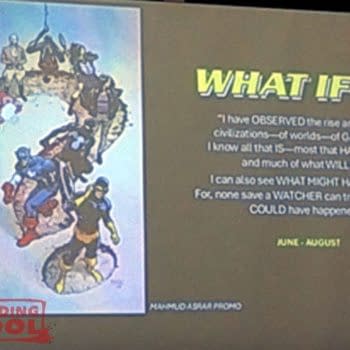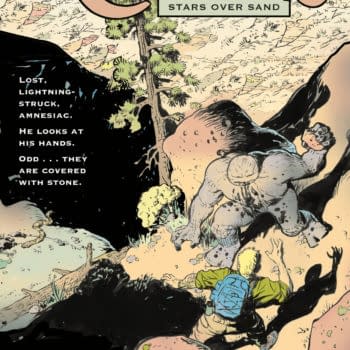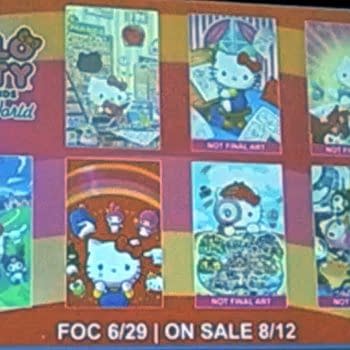Posted in: Comics, Current News | Tagged: dennis barger, diamond
How A Podcast "Created A Lot Of Problems" For Diamond Bankruptcy
The Diamond Comic Distributors' Chapter 11 bankruptcy court transcripts reveal the how a podcast "created a lot of problems"
Transcripts of previous court sessions in the Diamond Comic Distributors Chapter 11 bankruptcy case have been unsealed. And, amongst other things, concern the appearance of Alliance Entertainment (or AENT) CEO Bruce Ogilvie on the Industry Of Comics comic book retailer podcast withBryan McClay, Dennis Barger and Jesse James. And how it may have created complications for AENT's initial auction win.
When the Diamond Chapter 11 Bankruptcy auction at Raymond James offices was finalised, the winner was announced as Alliance Entertainment/AENT. Bruce Ogilvie, AENT chairman, was then invited onto the podcast after, apparently, watching my performance on it the previous week, talking about the Diamond situation. He also talked about the company, how he came independently to the Diamond auction, why he bid what he did, how the auction went, and his plans for Diamond as the winner.
But then suddenly Diamond declared that the back-up bidders Universal Distribution and Ad Populum/Sparkle Pop were the winners instead, and it descended into court reversals, lawsuits, and accusations, which are still playing out now. AENT, after being confirmed as the winner by the courts, withdrew from buying Diamond a short time later, claiming fraud, and has now launched a lawsuit for costs.
On the 7th of April, Diamond Comic Distributor Inc, the debtors in the Chapter 11 bankruptcy of Diamond Comics were represented in court by Mark Minuti of Saul Ewing, Alliance Entertainment or AENT, represented by Jason Teele, the Creditors' Committee represented by Gianfranco Finizio, and the DIP lender JPMorgan Chase, represented by Katherine Culbertson, with other creditors such as The Pokémon Company International and Bandai Namco present.
Again, we returned to AENT, winning the auction and beating out Universal Distribution and Ad Populum. Only for disputes over the inclusion, or not, of $4.3 million in prepaid inventory, leading to the debtor's decision to proceed with Universal and Ad Populum as the "highest and best" bid. We know that AENT win this court battle, before rejecting their victory shortly afterwards.
Diamond Comics transcript records
Bleeding Cool has previously reported on the impact this podcast made, now we have cold hard proof in terms of witnesses taking the stand, with allegations that he essentially spoke out of turn, before the details of the sale had been finalized, and caused disruption in the comic book community. Robert Gorin of the Debtors took to the stand and talked about his reaction to seeing Bruce Ogilvie talk about his win, publicly.
"So the day after the auction ends, that very next day, chairman of Alliance goes on a video on YouTube for a transaction that's not yet papered and starts talking about plans of what's going to happen. That created a lot of problems — as an operator, that created a lot of issues based on the messages that were interpreted, that were heard, that were said on that call. One was a conversation about consolidating warehouses. So the current organisation has five warehouses, and there was a conversation with the chairman about consolidating warehouses. As you can imagine, the calls started to come in from employees: Am I out of work? Do I not have a job? I don't understand. I'm very concerned… And so now, at a time when the company is very vulnerable, we're trying desperately to keep this thing together, we're really continuing to kind of almost duct tape the aeroplane while we're flying it, if you will. Now we have a lot of noise that we got to deal with. Retailers are calling the company and saying, I've got to get my stuff within a certain period of time. I need it in 24 to 48 hours upon my order. If you're going to consolidate, how are you going to get it to me that quickly? And so it created those issues. And then vendors wanted to know, are you still doing business with me, you're consolidating, the video was unclear about our comic, are you moving forward in the comic book world and what we call floppies. And, you know, with that, the employees on the print side want to know, do I have a job? And it's a really tough conversation when you're trying to convince somebody to continue to work, to be motivated, that this is ultimately a very good thing. And they're seeing this externally, and they're saying, I don't even know if I'm going to have a job. What am I supposed to do now? Should I immediately go out and start to look for a job? And so it created a lot of distraction, heartache, and I'll call it lack of focus within the organisation."
In later testimony, he broke these down a little.
"First of all, we don't have an agreement papered, right? We don't even have a draft…. Second of all, there was conversation about what went on in the auction that was not necessarily public information that I don't know needed to be shared. The chairman started to give opinions of what he thought was going to happen, even saying, "I'm not very familiar with comics, that's not something I'm well-versed in, I don't know the company very well, but clearly they're not doing it right because look where they are". And he began to give opinions about, for instance, the warehouses. He talked about price points and mentioned, we don't really want to deal in five-dollar price points. Most comic books are under $5 so that created an atmosphere of, well that means he's not going to do comic books. If he wants 15, $20 price points and above, he's not really interested in doing comic books, that's a fair piece of our business."
It is something that did cause some consternation at the time, it's true. Gorin continued,
"He talked about the collectible grading business. He said he didn't really know a lot about it. He said that they didn't visit that site… the basic message was that they had messed up the grading business somehow. The general indication was that there was a real problem there, but indicating that he hadn't spent a lot of time on it."
And there was Free Comic Book Day, with Gorin revealing his own comic book history.
"Your Honor, as a long-time comic book collector, it's a big day. You wait in line, you go, and you wait in line… There could be, you know, a couple hundred people in line. And it's an exciting day. And I think retailers have come to value it significantly. And that's one of the biggest questions we've received since this whole thing started: what about Free Comic Book Day? That's going to continue, right? I mean, that's one of the biggest questions we've received."
And Gorin did not like what Ogilvie said about it at all.
"He says that it clearly hasn't been monetized correctly, you haven't made any money on it. I believe there's a statement along the lines of "there's no free CD or free record album day" or something along the line that caused both the staff that work on Free Comic Book Day, and retailers to really become concerned that this was not part of the future, that this would not continue."
Then there were the warehouses.
"He used Amazon as an example and talked about how you want to have one big warehouse rather than having multiple small warehouses, and the scale and scope and benefit that gives you. Well, at the current time, we have five warehouses spread across the country. And they're spread strategically so that when an order is received, particularly on the Alliance game side, any order can be delivered to any retailer within 48 hours, 24 to 48 hours. And so the concept of now consolidating warehouses into potentially one large warehouse had the retailers concerned because now retailers closer to where the warehouse is situated have a potential advantage over other retailers."
Also the Diamond staff.
"It creates concern because now employees are wondering if they should stay. And that became a very loud topic within the company. Do I stay? Do I leave? You know, I have to take care of my family. If I don't have a job, you know, within a few weeks, I need to do something about that. Do I leave? You know, I have to take care of my family. If I don't have a job, you know, within a few weeks, I need to do something about that. It created concern with vendors saying, well, I can't really tell what your business model's going to be going forward. Maybe it's not a good idea for me to continue selling you product, which makes it difficult to then supply product to the retailer. So it created a lot of noise and a lot of distraction at a time when we're trying to be hyper-focused, we're trying to keep this organisation running as best we can, so that the next version of the organisation can blossom. Created concern for me that perhaps, you know, other backup bidders might say you've now had loss of value, your sales could be potentially down, or you don't have the same relationships… because they're distributors, they're selling relationships. And now all of those relationships are in flux because people are not sure, they can't have a fulsome conversation with the relationships on the other side, with third parties. It was a difficult few days from an operational perspective."
In cross-examination from AENT's lawyer, Gorin stated that it wasn't the podcast per se that caused all the issues but that,
"some of the items that I talked about predate the auction. And when you look at all these individually, okay, things happen. But when you start to add them all up, you get a feeling… I said that in my best business judgment, adding all of those things together, the best opportunity to close was the backup." And he did admit that as a result of the podcast, he wasn't aware of any employees quitting, retailers stopping selling Diamond products, or vendors stopping doing business with Diamond, just that it created "angst in the marketplace and within the company, it created additional noise that we had to deal with above and beyond the day-to-day running of the company. And already holding everything together with the concerns that were out there, it magnified the concerns."
In later testimony, Gorin said that his concern was for employees being worried about their job, and it wasn't just the podcast reach, it was, well, me. A bit.
"First of all, there were articles published about that. People download the podcast, and pieces of it were being shared. There were summaries that were being shared, you know, people who were watching it and sending around salient points that they thought were critical for various employees or etcetera to understand that was being shared. So the damage was well beyond the number of people who watched the podcast."
Apparently, a tree falling in a forest does make a sound, even if there are only a few hundred views of it on YouTube. More to come…
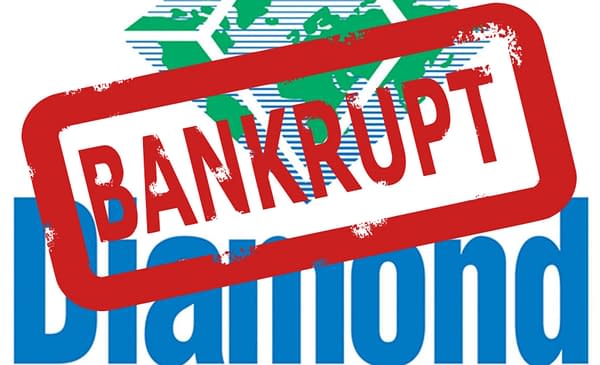
You can use these Diamond tabs to keep up with the latest on Bleeding Cool. Here's a timeline if you want to catch up…
- On the announcement of Chapter 11 on the 14th of January, Diamond started a 13-week bankruptcy process run by financial firm Raymond James, got financing to operate, and announced an auction for its assets.
- Those assets included Diamond Comic Distribution, Alliance Gaming Distribution, Diamond Select Toys, CGA and Diamond UK
- Universal Distribution was named the Stalking Horse bidder for Alliance Games and Diamond UK, which required a purchase commitment of thirty-nine million dollars, but with certain discounts and privileges for taking that position.
- The auction took place, and it went late. There was food and breakfast billed for.
- And Alliance Entertainment, or AENT, was named the top bidder for the assets of $72,245,000, though not for Diamond UK. This was widely announced, including by Diamond themselves.
- Then we learned that a joint bid by Universal Distribution and Ad Populum came second and was named the back-up bid, with a bid of $69,130,000. With Universal getting Alliance Gaming and Diamond UK, and Ad Populum getting Diamond Comics, Diamond Select Toys and everything else. Basic Fun was third with fifty million.
- Bruce Ogilvie, AENT chairman, was invited onto a podcast with comic book retailers Dennis Barger and Jesse James after, apparently, watching my performance on the Beyond Wednesdays podcast in which he talked about AENT and Diamond.
- A court hearing with the Honorable Judge Rice in Courtroom 9-D at the United States Bankruptcy Court for the District of Maryland at 10 am was intended to ensure the legality of the bid and the process.
- But instead, over that weekend, the debtors declared that they had chosen the back-up bid from Universal and Ad Populum instead of AENT, despite AENT having bid more. No reason was given.Diamond's Dick Move: the
- AENT filed a lawsuit regarding this decision.
- It took the bankruptcy court to reverse that decision and state that AENT, with the higher bid, had won, though they would have to withdraw their lawsuit.
- AENT has terminated their winning bid and purchase.
- Universal Distribution and Ad Populum were back in the running
- Diamond declared "business as usual" but the courts threatened Chapter 7 over late paperwork.
- AENT sued Diamond, claiming fraud
- Diamond says it's all in hand and went back to court, wanting to be owned by Universal and Ad Populum.
- Sale of Diamond to Universal and Ad Populum was approved by the courts.
- Though Ad Populum paid more than we thought.
- Podcast blamed/credited with the current state of affairs
- Diamond tells Skyrush to stop claiming they won CGA.
- As part of court filings, Diamond released details for every comic store on account.
- We have some finality.
- Ad Populum and Universal Distribution officially acquire Diamond and related assets.
- The layoffs have begun.
- And continue.
- Diamond Select Toys has closed
- Diamond try and reassure retailers over ComicSuite
- Courts withdraw Chapter 7 bankruptcy threat
- We look at the future of Diamond Previews again
- PRH pulls out of Diamond entirely
- Well, not entirely, the UK can stay.
- Hermes Press says Diamond doesn't want to distribute their comics anymore… or anyone's.
- But Diamond pushes back on that, as they publish a new Previews.
- And they assure comic book stores that everything is going to be fine. Honest.
- Then send a letter to publishers which looks like it isn't
- Now they are looking for more money and longer to pay it back.
- Dynamite would like half a million now, please.
- Udon and Manga Classic have now cancelled all Diamond orders.
- Then so did Drem Productions
- And PRH starts to close their special retailer joining offer
- Diamond gets a fourth wave of funding and deadlines.
- Philbo Distribution launches.
- Alliance Entertainment hire seven senior Diamond staffers.
- Universal Distribution rumoured to be hiring Diamond staffers to enter the US market.
- Massive Distribution expands within Lunar
- Diamond has cancelled all their PRH orders.
- There are problems with Ad Populum's first payments to comics publishers
- Ad Populum sues AENT alleging breaches of confidentiality and staff poaching.
- Ad Populum still ghosting publishers.
- Bankruptcy timeline revealed it began in July 2024
- Diamond ends cash on delivery sales
- Hermes Press hires Steve Leaf
- Diamond responds to Dynamite
- Diamond closes No Cost Orders, sends out reminder emails to comic book stores
- Boom Studios makes layoffs.
- Zenescope pulls out of Diamond.
- AENT Says Diamond Claim They Poached Staff "Fails As A Matter Of Law"
- It's Claimed New Diamond Owner Said He's "Playing Chicken With Idiots"
- Mike Schimmel Talks, Under Oath, About The Diamond Comics Firings
- Dynamite jumps to Lunar Distribution
- Diamond takes Previews digital only
- Universal Distribution to distribute in the USA as well as Canada, starting with DC Comics
- Conflicting Statements Over Diamond, AENT And Ad Populum Lawsuits
- This Week, There Are Only Five Comics On Diamond's FOC
- Robert Gorin, Chief Restructuring Officer Of Diamond Comics, And Geek
- Titan Has Not Received Payments From Diamond Comics, Stops Supplying
- Fantagraphics Says That Diamond Is Holding Their Comics Hostage
- Kathy Govier, Chief Marketing & Communications Officer, Out At Diamond
- Confirmed, AENT Tried To Buy Diamond In October To Avoid Bankruptcy
- Dynamite Pulls Their Comics Out From Diamond Comic Distributors
- Diamond Moves To Liquidate All Consigned Comics "Held Hostage"
- FairSquare Graphics Calls Diamond "Thieves & Bandits", Brings Receipts
- Ultimate Comics Chain Refuses To Buy Diamond Liquidation Stock
- This One Trick Means Bandai Get Their Pokémon Cards Back From Diamond?
- Dren Productions Want To Know If Diamond Shipped Their Recent Comics?
- Publishers Have 3 Weeks To Object To Diamond Comics' Liquidation Plans
- Emily Botica, Vice President At Diamond Comics, Is Leaving Next Week
- SDCC Gossip: What's Happening With Diamond At San Diego Comic-Con?
- Universal To Offer DC Comics To US Retailers At Same Lunar Discount
- Comic Publishers To File Paperwork Against Diamond Comics This Week
- Diamond Pulls Its Pullbox And Cancels Its ComicSuite For Comic Shops
- The Exit Interviews Of Diamond Comic Distributor Staff In Full
- Andrew Aiello, Tom Derby & Ben Davis Buy CGA After Diamond Bankruptcy
- Dynamite Owed A Million By Diamond, Can't Make Payroll Next Week
- Ad Populum Can't Yet Deal Directly with Diamond Consignment Vendors
- As Court Denies Dynamite Over Diamond, Comic Creators Rally Round
- Paizo speaks out about their Diamond troubles
- TwoMorrows Legally Objects To Diamond Bankruptcy Liquidation Of Stock
- Graphitti Designs & Magma Comix File Legal Paperwork Against Diamond
- Dynamite, Fantagraphics, Drawn & Quarterly Team Up Against Diamond
- Sealed Transcripts Over The Diamond Comics Bankruptcy Auction, Opened
- Diamond's Reason To Reject Alliance Entertainment Was Down To One Hour
- AENT Claims "The Fix was Definitely in" on Diamond Bankruptcy Auction
- Diamond Comics Was Already Looking For A New Buyer Back In 2023
- Mad Cave Studios makes layoffs
- Dynamite Signs With Simon & Schuster For Bookstore Comics Distribution
- Avatar Press Joins Anti-Diamond Liquidation Publisher Coalition
- Bankruptcy Court Moves Diamond Hearings Till After San Diego Comic-Con
- Image Says Diamond's Goal Is "Stealing" $3,000,000 of Comics From Them
- JPMorgan Chase Reminds Diamond Comics As To Who Gets The Money
- Universal Makes DC Comics Available To US Shops Via Alliance Gaming
- Diamond Comics Sells Diamond UK For Over $2 Million To… Diamond UK






